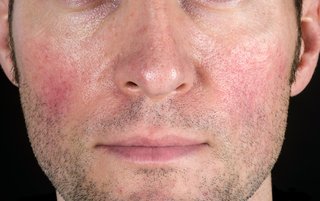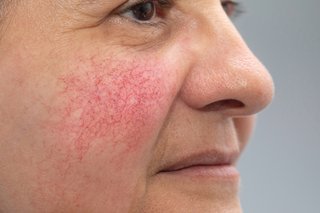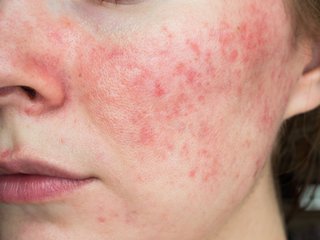Rosacea is a long-term skin condition that mainly affects the face. It's more common in women and people with lighter skin, but symptoms can be worse in men. Treatment can help control the symptoms.
Check if you have rosacea
The first signs of rosacea include:
- redness (blushing) across your nose, cheeks, forehead and chin that comes and goes
- a burning or stinging feeling when using water or skincare products
The redness may be harder to see on darker skin.



Other symptoms can include:
- dry skin
- swelling, especially around the eyes
- yellow-orange patches on the skin
- sore eyelids or crusts around roots of eyelashes – this could be blepharitis
- thickened skin, mainly on the nose (usually appears after many years)
Causes or triggers of rosacea
It is not known what causes rosacea, but some triggers can make symptoms worse.
Common triggers for rosacea include:
- alcohol
- spicy foods
- cheese
- caffeine
- hot drinks
- aerobic exercise like running
If you're not sure it's rosacea
Rosacea can look a lot like other conditions, such as:
- acne
- contact dermatitis, seborrhoeic dermatitis and other types of dermatitis
- lupus
- keratosis pilaris
When to contact your GP
Contact your GP if you have rosacea and:
- your eye is painful
- your vision is blurred
- you're sensitive to light
- you have a red eye
- your eye feels gritty
These could be signs of keratitis, which can be serious if not treated urgently.
Treatment for rosacea from your GP
Rosacea cannot be cured but treatment from your GP can help control the symptoms. It can get worse if it's not treated.
Your GP may suggest:
- prescriptions for creams and gels you put on your skin
- taking antibiotics for 6 to 16 weeks
- IPL (intense pulsed light) treatment
Your GP may refer you to a skin specialist (dermatologist) if treatments are not working.
Things you can do to help
Rosacea is not caused by poor hygiene and it is not contagious. But there are things you can try to help with symptoms.
If you know that a trigger makes symptoms worse, try to avoid it as much as possible.
Do
-
wear a high SPF sunscreen of at least SPF 30 every day
-
try to avoid heat, sunlight or humid conditions if possible
-
try to cover your face in cold weather
-
use gentle skincare products for sensitive skin
-
clean your eyelids at least once a day if you have blepharitis
-
take steps to manage stress
Don't
-
do not drink alcohol
-
do not have hot drinks
-
do not have too much caffeine (found in tea, coffee and chocolate)
-
do not eat cheese
-
do not eat spicy food
-
do not do too much aerobic exercise, like running
Content supplied by the NHS and adapted for Ireland by the HSE
